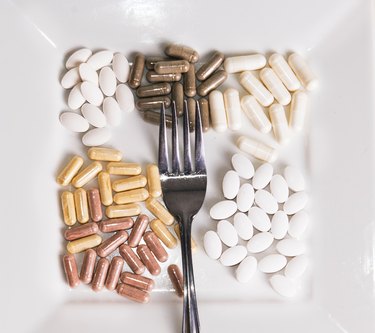
Whether your doctor has prescribed you diet pills or you've purchased them over-the-counter, you should understand their function before you begin taking them. You may discover that, while you achieved weight loss while taking the pills, you gained that weight back once you stopped taking the medication. Carefully weigh the advantages and the disadvantages before you begin a diet pill regimen under your doctor's supervision.
Function
Video of the Day
Your doctor may talk to you about going on diet pills when you're having trouble losing the weight on your own. Under medical supervision, they can help expedite your own efforts for better results. Some pills, such as orlistat or Alli, block the absorption of fat into the body, while other pills, such as diethylpropion, help to curb your appetite.
Video of the Day
Advantages
Diet pills can help make up the difference when your own efforts are not enough. While you can purchase Alli over-the-counter, according to the Mayo Clinic, your doctor must prescribe diethylpropion and phentermine. That means that you've opened up a dialogue with your health care provider about your weight, and he has deemed it necessary that you try diet pills to help you lose the weight. Diet pills can help you stay motivated to maintain a healthy lifestyle.
Disadvantages
When you stop taking your diet pills, you may stop dieting and watching your caloric intake. Without the extra boost of the diet pills, you may gain the weight again. Diet pills don't teach you how to properly eat, so unless you're proactive in securing a healthier lifestyle, once you stop the pills, the weight loss will stop as well. You may also gain a dependency on the diet pills, according to FamilyDoctor.org, a division of the American Academy of Family Physicians, which is why you should stop taking them with a doctor's supervision and guidance only.
Safety
Prescribed and over-the-counter diet pills are typically safe, as they've been approved by the FDA expressly for weight loss, and they have minimal side effects. Weight loss supplements, however, are not as heavily regulated by the FDA, which means they are not tested for ingredient safety. You may experience more adverse effects after you take weight loss supplements and so-called diet pills, since their labeling standards are not the same as those of pharmaceuticals, according to nutritionist Anne Collins.
Considerations
Diet pills are not the only way to lose weight. In fact, you should use diet pills only under the recommendation and supervision of your health care provider. You'll eventually gain the weight back after taking diet pills if it's the only action you've taken against your weight. Instead of relying on pills, Medline Plus advises, try cultivating a healthier lifestyle through physical activity, a low-calorie diet and a switch to drinking water instead of sugary drinks. A healthy diet teaches you the right way to eat so you can manage your weight indefinitely.